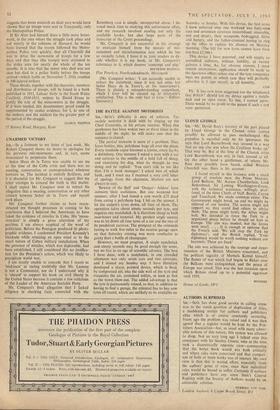LLOYD GEORGE
Si,—Mr. David Rees's travesty of the part played by Lloyd George in the Chanak crisis cannot possibly be allowed to pass unchallenged. His prejudice is equalled only by his ignorance. He says that Lord Bcaverbrook was 'around in a way that no one else was when the Coalition broke up.' That may be. But at the time of the Chanak crisis Lord Beaverbrook was not, in fact, around at all. On the other hand a gentleman, of whom Mr. Rees may possibly have heard, called Winston Churchill was. Here is his account : I found myself in this business with a small group of resolute men; the Prime Minister, Lord Balfour, Mr. Austen Chamberlain, Lord Birkenhead, Sir Laming Worthington-Evans, with the technical assistance, willingly prof- fered, of the three Chiefs of Staff, Beatty, Cavan and Trenchard. We made common cause. The Government might break up and we might be relieved of our burden. The nation might not support us; they could find others to advise them. The press might howl, the Allies • might bolt. We intended to force the Turk to a negotiated peace before he should set foot in Europe. The aim was modest, but the forces were small. . . . It is enough in epitome that the French said, 'We will stop the Turk by diplomacy': and the British replied, 'Your diplomacy would be worth nothing without our bayonets. These are fixed.'
• The aim was achieved by the courage and deter- mination of the British Ministers concerned, and the political sagacity of Mustafa Kemal himself.
• The flames of war which had begun to flicker over • the Balkans were extinguished, and the peace of Europe was saved. This was the last occasion upon which Britain stood up to a potential aggressor until 1939.
House of Lords, SW!
BOOTIIBY






































 Previous page
Previous page